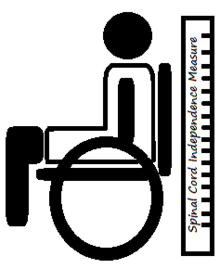Spinal Cord Independence Measure
Outcome measures in rehabilitation medicine are tools used to evaluate the level of disability.[1] They can be beneficial for physicians to judge the path of patient's recovery, for researchers to compare different management protocols and for politicians in order to find the cost-effectiveness of their decisions.

As an outcome measure specifically designed for spinal cord injury, the Spinal Cord Independence Measure is a tool that evaluates how safely, cheaply, and independently a patient can do basic activities of daily living.[2][3]
Structure
The measure consists of 19 items categorized in three subscales:self care, respiration and sphincter management, and mobility.
Psychometric property
Its last version, SCIM III has been validated in many multicenter trials[4][5][6] and translated into Italian,[7] Spanish,[8] Greek,[9] Portuguese,[10] Thai,[11] Turkish[12] and Persian[13] languages. It has been concluded that SCIM III has the most appropriate psychometric properties for measuring functional level of spinal cord injured individuals.[14][15]
References
- Alexander, MS (2009). "Outcome measures in spinal cord injury: recent assessments and recommendations for future directions". Spinal Cord. 47 (8): 582–591. doi:10.1038/sc.2009.18. PMC 2722687. PMID 19381157.
- Catz, Amiram (1997). "SCIM--spinal cord independence measure:a new disability scale for patients with spinal cord lesions". Spinal Cord. 36 (10): 734–5. doi:10.1038/sj.sc.3100738. PMID 9800278.
- Catz, Amiram (2007). "Spinal Cord Independence Measure:comprehensive ability rating scale for the spinal cord lesion patient". Journal of Rehabilitative Research. 44: 65. doi:10.1682/JRRD.2005.07.0123.
- Anderson, KD (2011). "United States (US) multicenter study to assess the validity and reliability of the Spinal Cord Independence Measure (SCIM III)". Spinal Cord. 49 (8): 880–885. doi:10.1038/sc.2011.20. PMID 21445081.
- Itzkovich, M (2007). "The Spinal Cord Independence Measure (SCIM) version III:reliability and validity in a multi-center international study". Disability and Rehabilitation. 29 (24): 1926–1933. doi:10.1080/09638280601046302. PMID 17852230.
- Catz, Amiram (2007). "A multicenter international study on the Spinal Cord Independence Measure version III: Rasch psychometric validation". Spinal Cord. 45 (4): 275–291. doi:10.1038/sj.sc.3101960. PMID 16909143.
- Invernizzi, M (2010). "Development and validation of the Italian version of the Spinal Cord Independence Measure III". Disability and Rehabilitation. 54 (7): 553–560. doi:10.1038/sc.2015.187. PMID 26481705.
- Zarco-perinan, MJ (2014). "Development of the Spanish version of the Spinal Cord Independence Measure version III: cross cultural adaptation and reliability and validity study". Disability and Rehabilitation. 36 (19): 1644–1651. doi:10.3109/09638288.2013.864713. PMID 24320025.
- Michailidou, CML (2016). "Translation into Greek and initial validity and reliability testing of a modified version of the SCIM III, in both English and Greek, for self use". Disability and Rehabilitation. 38 (2): 180–188. doi:10.3109/09638288.2015.1035454. PMID 25875048.
- Riberto, M (2014). "Validation of the Brazilian version of the Spinal Cord Independence Measure III". Arq Neuropsiquiatr. 72 (6): 439–444. doi:10.1590/0004-282X20140066.
- Wannapacke, J (2016). "Reliability and discriminative ability of the spinal cord independence measure III (Thai version )". Spinal Cord. 54 (3): 213–220. doi:10.1038/sc.2015.114. PMID 26169167.
- Unalan, H (2015). "Validity and reliability study of the Turkish version of Spinal Cord Independence Measure III". Spinal Cord. 53 (6): 455–460. doi:10.1038/sc.2014.249. PMID 25665539.
- Saberi, H (2018). "Development of Persian version of the Spinal Cord Independence Measure III assessed by interview : a psychometric study". Spinal Cord. 56 (10): 980–986. doi:10.1038/s41393-018-0160-5. PMID 29802395.
- Anderson, K (2008). "Functional recovery measures for spinal cord injury:An evidence based review for clinical practice and research". Journal of Spinal Cord Medicine. 31 (2): 133–144. doi:10.1080/10790268.2008.11760704. PMID 18581660.
- Furlan, Julio C (2010). "Assessment of disability in patients with acute traumatic spinal cord injury:a systematic review of the literature". Journal of Neurotrauma. 28 (8): 1413–1430. doi:10.1089/neu.2009.1148. PMC 3143412. PMID 20367251.